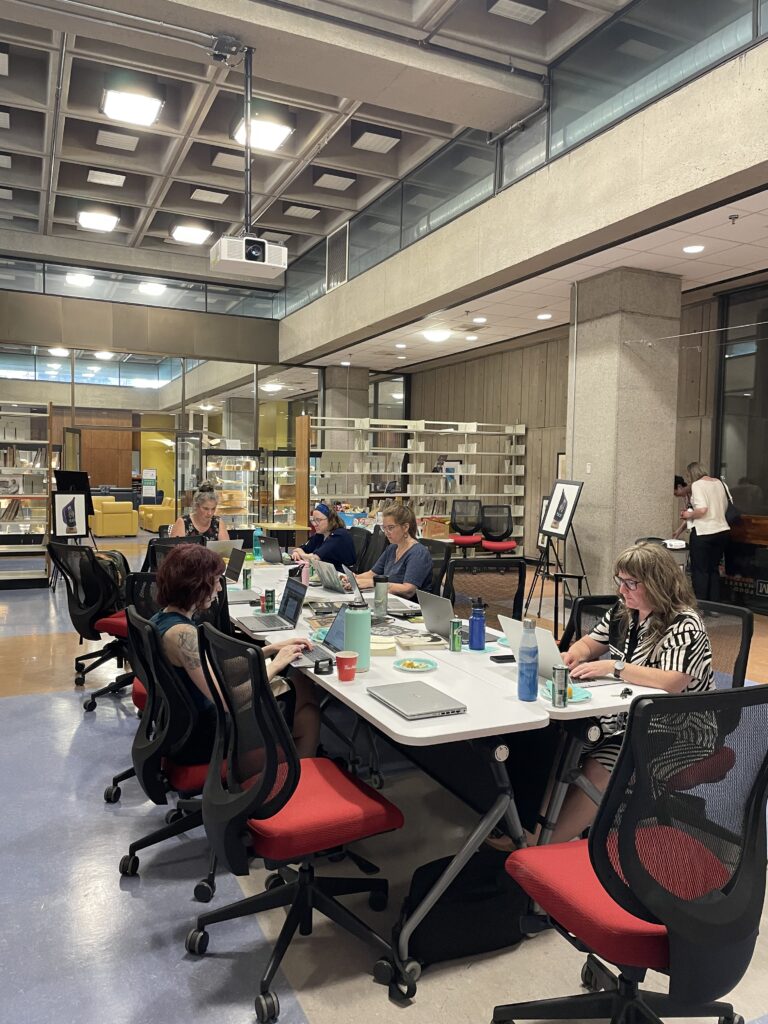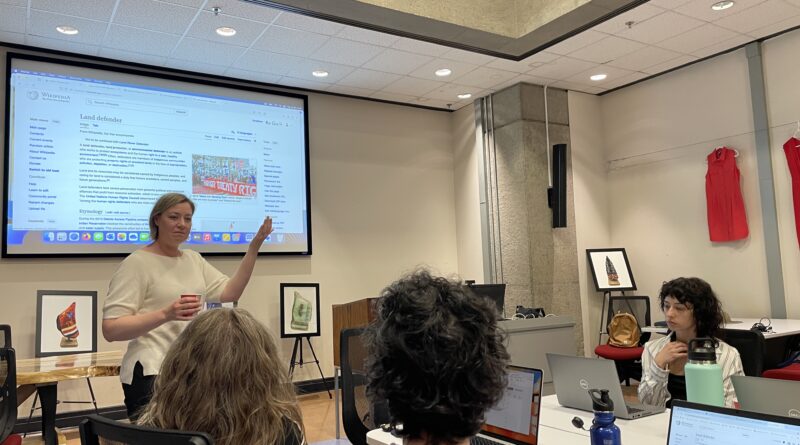Indigenous History Month: Wikipedia Edit‑a‑thon at Dalhousie University
Article written by Caelin Nash – Community and Engagement Strategy Intern – Faculty of Management, Dalhousie University
This event was partially funded by the Wikimedia Canada micro grant program.
As I walk into the Killam Library at Dalhousie University to attend a Wikipedia edit-a-thon, all I can think about is what my teachers as far back as elementary have told me, ‘Wikipedia is for lazy researchers and it’s full of inaccuracies.’ Which is why coming to this event feels almost sacrilegious. But I’ve been given an assignment to write about it and so this is now an opportunity to learn about something I’ve avoided all these years.
Inside the Ko’jua Okuom, the Indigenous community room within the larger library, I find a small group seated around a table, listening to the one individual who’s standing. Dr. Stacy Allison-Cassin, an assistant professor in Dal’s Faculty of Management and a citizen of the Metis Nation of Ontario, is telling them that she’s “… always been passionate about connecting people to good sources of information.”
I don’t say it out loud, but in my head, I’m wondering how a free online encyclopedia with articles written by volunteers translates into being a ‘good source of information’?
Allison-Cassin tells us “These events can last anywhere from an hour to a full day. They usually start with a presentation to introduce newcomers. People bring their laptops, sit wherever they like, and dive into their work, while also having the chance to circulate and have conversations.”

But it’s not until she explains that this event, part of an ongoing effort to bring together enthusiasts, researchers, and activists, into a collaborative space to edit and write articles for Wikipedia, that my mind starts to turn in another direction. The information, she continues, “is continuously updated and reviewed by the community to ensure accuracy and reliability.”
We’re then provided with a list of articles needing work and Allison-Cassin is going to write an article from scratch about Alan Syliboy, a Mi’kmaq artist, who currently has an exhibit at the Dal Art Gallery. The group can’t believe there isn’t an entry on him already on Wikipedia.
This particular event, during National Indigenous History Month highlights the importance of ensuring there is Indigenous knowledge on Wikipedia. “I’ve been working on the intersection of Wikipedia, Wikidata, and Indigenous knowledge for a while,” Allison-Cassin explains. “Studies have shown there’s also a significant gender imbalance on Wikipedia content. It’s great if you’re a white man because a lot of content focuses on things that interest white men—sports, certain pop culture, politics,” she says, adding, “but there’s a noticeable lack of coverage on women and marginalized communities.”
Before getting started, there’s one more topic to discuss; is all content appropriate for the platform? Very quickly, the group establishes that some traditional Indigenous knowledge is sacred and should not be shared widely. And with that, they begin.
One participant, who works as a research assistant on medical terminology, tells me the event is a perfect fit for their background and interests. They say, “I’ve been looking at different indigenous vocabularies and classification systems. This event aligns well with my research, and I wanted to participate because I had taken a few classes on Wikidata during my graduate studies.”
While the group continues, I return to Allison-Cassin to dig deeper as to why she considers Wikipedia ‘a good source’ of information. She explains that contrary to what many believe, Wikipedia is not just a platform where anyone can freely edit articles with any information they wish. Yes, she says it’s possible for anyone to edit or publish an article, but it is next to impossible for that information to be false – or even have bias; that’s because everything that’s written, must have a source.
Allison-Cassin says there another very important reason she works so hard to fill in the gaps, writing about individuals, like Alan Syliboy “Wikipedia plays a crucial role in the information landscape, not just for individuals, but because it’s used by search engines like Google. There’s a reason it often appears as a top search result—it’s widely used and trusted.”
I wondered how much of a difference an event like this would have to such a massive platform. But Wikipedia’s dashboard shows this small group over the course of a few hours edited 19 Wikipedia articles, added 50 references and contributed more than 3,300 words.
Walking away, I have a different question circulating in my head than when I arrived. Why aren’t educators teaching students how to use Wikipedia effectively? And why aren’t they finding opportunities for their students to participate in edit-a-thons?
I leave with a small sense of regret for overlooking Wikipedia all these years; But instead of regret, I now know that Wikipedia is a starting point for research, a tool for gaining a broad overview, and a way to discover references and additional resources. Wikipedia is no longer something to avoid, but a guide to take me deeper into the subjects I want to explore.
Photo credits: Dalhousie University – CC BY-SA 4.0

